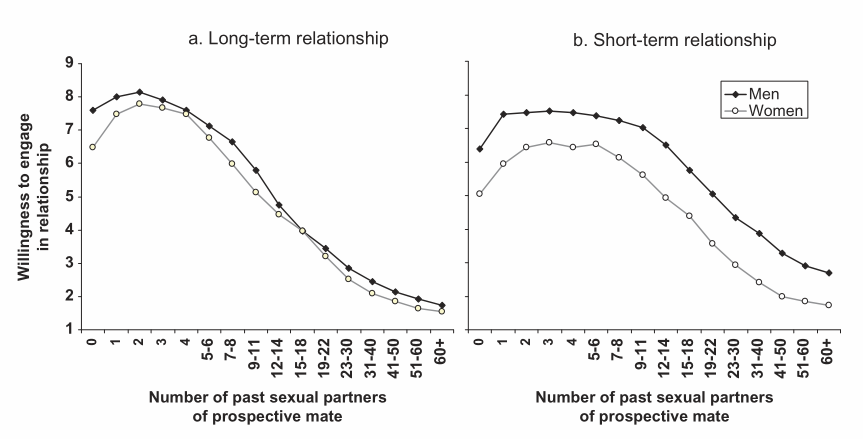Is It True that the Standard Answer to the Question "How Many Lovers Have You Had?" Is 3?
The article explores the relationship between past relationship experiences and the willingness to engage in a new relationship. It discusses how different relationship histories, like having some or a long history, can affect a person's attractiveness. Gender double standard and short-term/long-term relationship goals are also considered as influencing factors. Overall, both men and women are similarly affected in long-term relationships, while men are more tolerant in short-term ones. The path to love is complex and goes beyond research conclusions.
Imagine being in the girls' dorm, gossiping and discussing with your roommates.
"My future boyfriend, he can only have one woman in his life, me." A said enamoured.
"Ah, but I hope he has some experiences and can read women's hearts (gently)." B objected.
"But he's only ever had his heart for me, how faithful (loudly) and romantic!" A continues to indulge in fantasy.
"Only a man who has had experiences can feel me~" B hugged herself.
"I'm OK with it when he's had no more and no less women in his past (calm)." C expressed her opinion.
"As I see it, it's hard not to be a bastard if he has too many experiences (firmly)." D leaves the group chat after saying this.
What do you think?
When considering whether the other person is suitable to be a partner, you can consider various factors according to your own concept of love: the match degree of three fundamental views, personality suitability or likability, talent and ability, appearance and stature, etc., all of which you can make your own satisfactory assessment based on objective criteria.
But when the target says to you, "I had three or four boyfriends who made me grow up a lot." Or "I was in deep love with a girl, but we weren't really right for each other, and then I realised you were the best choice for me." , what would you do with that? Maybe ignore it, but then toss and turn in the dead of night ......
Don't worry! Psychologists have already thought about this for us, and they've stripped out from these scenarios the question of "the relationship between past experiences and an individual's willingness to engage in a relationship". That's right, psychologists have been conducting careful and nosy (kidding) research on sexual attraction, relationship experiences, individual judgement, acceptance, and other angles.

I. What Experience-Type Would You Prefer to Be in a Relationship With?
If he or she has a history of relationships, how would you think of him or her? Emotional, sexually desired, with qualities or talents favoured by the opposite sex, able to understand you better? Or is he or she has a flamboyant, playful love, fast-food relationship? All of these thoughts can influence the decision of whether or not to take the step further.
Fei Xiaotong once said: people's "present" contains the projection extracted from the "past". You always can not help but go to peep at his or her past, browsing endlessly his or her QQ space and WeChat moments. So psychologists have asked: does the amount of relationship experiences affect the degree of our willingness to engage with a particular individual? On the topic of the connection between relationship history and willingness to engage, the most essential would be the link between relationship history and attraction.
Researchers have found that the more attractive the partner, the stronger the willingness of individuals to engage in sexual contact (including dating and relationships) with him or her. This is also in line with our intuition, so does relationship history affect how attractive he or she is to you?
-
How Does a Person's Relationship History Affect His or Her Attraction?
Please imagine the following scenario:
If there was a blank relationship history, would you be suspicious of his or her attraction? Or do you attribute the lack of relationship experience to the fact that he or she has qualities of prudence, responsibility and fidelity? Is he or she not likely to fall in love or make a commitment?
If there is a vivid, novel-length history of love, will you think that he or she has a strong sense of charm and mystery? So the initial vision of a relationship arises ......
If the relationship history is too long, will you have doubts and worries about his or her character and concept of love? "Will I be just an interlude in his or her life too?" When he or she becomes less attractive to you, will you dismiss the idea of a relationship?
-
Some Relationship History Adds to Attractiveness.
Perceived attractiveness of others increases willingness to date. After A discovers that other people also find B attractive, A also becomes more convinced that B is attractive --- a universal phenomenon known as mate-choice copying. So, does having some relationship experiences imply some recognition by others of an individual's attractiveness?
In some cultures where premarital sex is liberal, individuals may be perceived as lacking specific social skills if they never had sexual or romantic experience, and the lack of experience can make the individual feel subject to prejudice. Maternal soloists in certain social contexts are 'less well-off', both in terms of lack of support and comfort in their lives, and may also feel socially isolated.
Thus, we and some researchers have hypothesised that, at least in relatively liberal cultures, individuals with some (note "some"!) relationship history (others have had willingness to engage with them) may be perceived as more attractive than individuals with very little relationship history.
On a local scale of the number of relationships, there is an increase in attractiveness and willingness to date with increased relationship history. Overall, however, willingness to date and the number of relationship experiences show a strong negative relationship.
II. Other Influencing Factors on Relationship History and Willingness to Date
-
Gender Double Standard
What is the gender double standard? It is rich in connotations, among which, according to the gender double standard, boys and men will be rewarded and praised for sexual contact with the opposite sex (including kissing, holding hands, sex acts, etc.), while girls and women will be degraded and humiliated for similar behaviour.
If it were true, it would mean that girls who have more relationship experiences are at greater risk of failure to establish long-term partnerships than boys. However, the data collected by the researcher did not support this hypothesis, suggesting that "gender double standard" does not seem to be a widespread phenomenon.
-
Short-term or Long-term Relationship
Researchers have found that there is an interaction between long-term or short-term relationship goals and gender as influencing factors on ultimate relationship intentions. What does it mean?
Now, let's analyse the specifics of the situation:
(1) If a long-term relationship is considered (the pursuit of a long-lasting relationship), there is no gender difference in the effect of the potential partner's relationship history on an individual's willingness to engage in a relationship. In other words, in the pursuit of happiness and finding lifelong love, both men and women are almost equally bothered by the relationship history of a potential partner: or rather, both sexes are most likely to date someone who has had two experiences in the past, and less likely to date someone who has had fewer or more experiences in the past.
(2) However, when considering a short-term relationship (a vigorous relationship, albeit a short-lived one), men are more tolerant of a partner who has had more experiences in the past than women. In this case, "your past doesn't matter much to me" and he may be more interested in the pleasure of being together in the present. However, when the number of past experiences gradually increased, both sexes showed a decreased willingness to interact.
The following figure clearly shows the willingness of both sexes to be in a relationship with TA under long and short-term relationship purposes (long-term on the left and short-term on the right) when TA has had a different number of sexual partners: (Note: the horizontal coordinate is the number of sexual partners in the past, the vertical coordinate is the willingness to be in a relationship, the upper curve is for males, and the lower curve is for females)

III. Conclusion Remark
Once upon a time, the day was long.
The carts, horses, the mail are all slow.
And time was only enough to love only one person.
--By Muxin
We've spent an article's time dissecting the connection between relationship history and willingness to date. However, the path to cultivating love is not one that completes experiments of controlling various variables. Without two hearts running in the same direction, then all the conclusions of relationship history research have no root to exist.
Truth comes out of practice, and may we all experience loving and being loved personally and authentically, finding your right person in the constant understanding of ourselves.

I once read a line of "literature of youthful pain" to the effect that "I don't want to ask about your past, that's your business. But I want to be involved in your future because it is my honour.
If you really meet someone you like, just move forward together.
Hot Articles

Break Barriers to Homeownership: No Down Payment, No-Income Verification Mortgages Available Now!

Unlocking Affordable 1-3 Bedroom Apartment Options

Secure Your American Education: 90% More Scholarships Available – Apply for Free Today!

El análisis de datos en la era digital: cómo transforma nuestra vida y decisiones